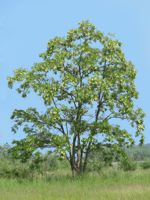Mon-Fri 9am - 5pm Mountain time
Mountain Maple vs Black Locust
Acer spicatum
Robinia pseudoacacia
CUSTOM GROW
SOLD OUT
Used to growing in the shadows of the damp forest, White Maple (aka Mountain Maple) is a great fit for shady and wet areas, such as beneath larger trees. Unlike most of its cousins, the White Maple is a shrub instead of a tree. It's still a maple, however, with sap that can be made into Maple syrup to prove it!
In May and June, the classic shapes of Maple leaves are joined by clusters of green and yellow flowers. Soon after, red samaras (aka helicopter seeds or whirligigs) appear. This distinctive appearance makes White Maple an excellent choice for giving urban yards a unique (and patriotic) look.
Black Locust is an attractive tree. Its distinctive leaves are made of about a dozen bright green leaflets. It also notable for its fragrant white flowers, which smell of citrus.
Black Locust can grow in many situations, but prefers dry areas with lots of sun. It is robust and is an excellent choice for establishing shade in dry, open areas.
Important note: Much of the Black Locust is toxic to humans and livestock, including seeds, bark, and leaves.

